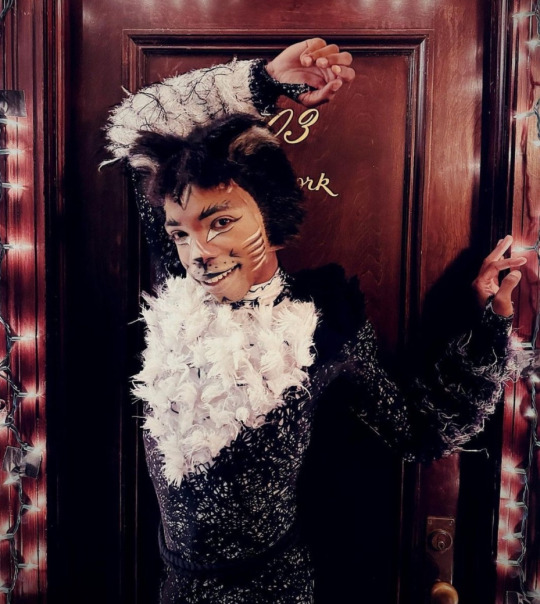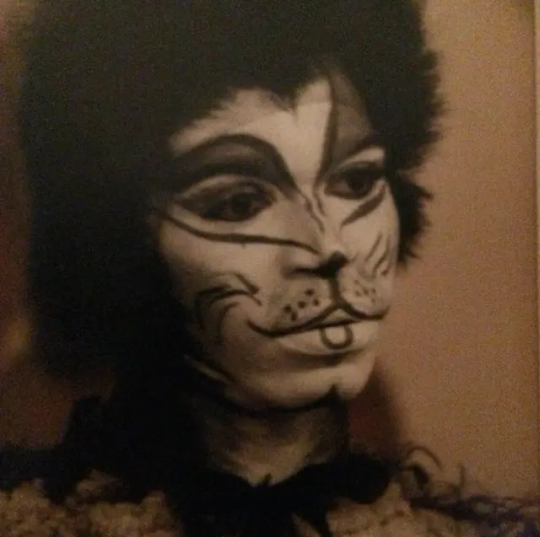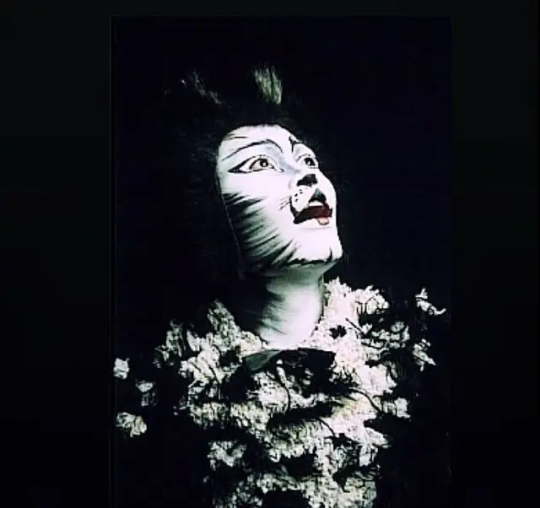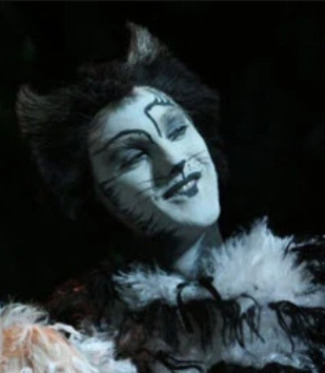#sam bateson
Explore tagged Tumblr posts
Text
Some people call it a short attention span.

Some people call it slutting around.

Personally, I call it multi-tasking.

How many flirtations can you carry on at once? That's what I thought. 😘
#tuggerina#tuggerlurina#tuggoffelees#rum tum tugger#bombalurina#mistoffelees#jarrad green#emily ormiston#sam bateson
164 notes
·
View notes
Text

Sam Bateson as Mistoffelees from the RCCL cast of Cats!
He's just a little guy, you know?
#I think its cast 13#but that cast changes out so much I lost track#anyway#cats#cats the musical#the cats musical#mycatsart#cats musical#misto#mistoffelees#mr mistoffelees#mr. mistoffelees#cats actor#sam bateson#Cats RCCL#RCCL cats
80 notes
·
View notes
Text
Misto takes a moment to play with Gus 😌



Zachary Berger as Gus and Sam Bateson as Mistoffelees; Oasis cast 13, May 2023 (X).
#mistogus#mistoffelees#asparagus cats#gus the theatre cat#gusxmistoffelees#c: mistoffelees#c: gus#s: gumbie cat#sam bateson#zachary berger#oasis#oasis 13#230500#cats the musical
58 notes
·
View notes
Text
Things to be missed in CATS onboard the Oasis of the Seas, from Issy Moore as Victoria.
Hugs with Plato.



With Lewis Rimmer as Plato, Sam Bateson as Mistoffelees, Olivia Swain as Sillabub, and Taila Halford as Jellylorum; Cast 13.
#CATS Musical#CATS the Musical#CATS RCCL Cast 13#Victoria#Issy Moore#Plato#Lewis Rimmer#Jellylorum#Taila Halford#Sillabub#Olivia Swain#Mistoffelees#Sam Bateson#Platoria
45 notes
·
View notes
Text
Liam Mower - Ibn Snell - Tibor Kovats



Pierpaolo Scida - Sam Bateson - Zachary Downer



Marvin Engran - Julius Sermonia - Jonathan Mercer



Revised version of this :]
#cats the musical#mistoffelees#jellicle polls#which misto makeup design am i going to be not normal about today?#the amount of self control it took to not include Timothy Scott you have no idea#he won the other one and it’s not like my blog is unbiased#Valentin Baraian isn’t here cause I realized there aren’t any good pictures of his makeup :(#at least none I could find </3#I thought of removing Pierpaolo Scida cause non-replica then I remembered this is my blog and I can do what I want <3#undescribed
27 notes
·
View notes
Text
Today's joy with Rachel Joy Scott Friday edits is Rest In Peace to those famous stars & angels Verne Troyer, Richard Griffiths, Alan Rickman, Richard Harris, Michael Gambon, John Hurt, Robbie Coltrane, Helen McCrory, Roberts Blossom, Billie Burke, Frank Sutton, Jim Nabors, Judy Garland, Margaret Hamilton, Clara Blandick, Shirley Temple and baby Leroy, Paul Grant, Leslie Phillips, Robert Hardy, Timothy Bateson, Terence Bayler, Robert Knox, Sam Beazley, Paul Ritter, Dave Legeno, Peter Cartwright, Derek Deadman, Hazel Douglas, Alfred Burke, Jimmy Gardner, Elizabeth Spriggs, Bob Newhart, Tom Poston, Dean Martin, Mary Frann, Betty White, Rik Mayall, Brian Nickels, Jerry Reed, Matthew Perry, Raymond Burr, Mary Ann Jackson, Dorothy DeBorba, Mary Kornman, Mildred Kornman, Peaches Jackson, Peggy Cartwright, Darla Jean Hood, Jean Darling, Peggy Montgomery, Bob Barker, Lucille Ricksen, Michael Kenneth Williams, Pat E. Johnson, Richard Burton, Cyril Cusack, Roger Lloyd Pack, Peter Frye, John Boswell, James Walker, Shirley Rosemary Stelfox, Shirley Jean Rickert, Janet Key, June Marlowe, Virginia Weidler, Jane Withers, Peter Michael Falk, Bruce Kirby, Mike Lally, John Finnegan, Robert Culp, Vito Scotti, Val Avery, Fred Draper, Alan Fudge, Gene Wilder, Jack Albertson, Richard Belzer, Richard Bull, Jerome Guardino, Bill Zuckert, Steven Gilborn, Ed McCready, Paul Carr, James Avery, Parley Edward Baer, Sherman Hemsley, Ellen Albertini Dow, Carl Reiner, Alan Wolf Arkin, Michael Jeter, Debbie Lee Carrington, James Caan, Ed Asner, Ana Ofelia Murguía, Paul Newman, Madge Sinclair, Robert Guillaume, Mary Ethel Gregory, Michael Landon, Katherine MacGregor, Kevin Hagen, Dabbs Greer, John Heard, Leonard Stone, John Candy, Victor Edwin French, Robin Williams, Peter Fonda, Geoffrey Palmer, Olivia Newton-John, Eve Arden, Rose Joan Blondell, Alice Ghostley, Darrell Zwerling, Dody Goodman, Lance Reddick, Andy Griffith, Don Knotts, Anissa Jones, Bridgette Andersen, Dominique Dunne, Samantha Reed Smith, Heather and Judith Barsi, Fred Rogers, Olivia Twenty Dahl, Roald Dahl, Sofie Magdalene Dahl, Walter Elias Disney, Ruth Flora Disney, Denise Marie Nickerson, Louis XVII, Lois Janes, Marie Thérèse de France, Christopher Plummer, Eazy-E, Peter Cartwright, John William "Johnny" Carson,
1 note
·
View note
Text
Books Read in 2023
The Prophet by Kahlil Gibran // Jan 2nd
The Very Secret Society of Irregular Witches by Sangu Mandanna // Jan 2nd-Jan 4th
The Gift by Daniel Ladinsky // Jan 5th-Jan 8th
Marbles: Mania, Depression, Michelangelo, and Me: A Graphic Memoir by Ellen Forney // Jan 10th-Jan 11th
Drizzle, Dreams, and Lovestruck Things by Maya Prasad // Jan 1st-Jan 12th
Heartstopper Volume 1 by Alice Oseman // Jan 14th (reread)
Heartstopper Volume 2 by Alice Oseman // Jan 15th (reread)
Hooked: How Crafting Saved My Life by Sutton Foster // Jan 15th
Lore by Alexandra Bracken // Jan 7th-Jan 16th
Belonging: A German Reckons with History and Home by Nora Krug // Jan 16th
Melt With You by Jennifer Dugan // Jan 17th-Jan 18th
Tomorrow, and Tomorrow, and Tomorrow by Gabrielle Zevin // Jan 19th-Jan 22nd
The Bad Guys (Episode 1) by Aaron Blabey // Jan 24th (reread)
The Bad Guys (Episode 2): Mission Unpluckable by Aaron Blabey // Jan 24th (reread)
The Cartographers by Peng Shepherd // Jan 23rd-Jan 25th
Stories from the Tenants Downstairs by Sidik Fofana // Jan 26th-Jan 27th
The Miseducation of Cameron Post by Emily M. Danforth // Jan 25th-Jan 27th
Thinking AIDS: The Social Response to the Biological Threat by Mary Catherine Bateson and Richard A. Goldsby // Jan 27th
Answers in the Pages by David Levithan // Jan 27th
Redwood and Ponytail by K.A. Holt // Jan 28th-Jan 29th
The Stonekeeper (Amulet #1) by Kazu Kibuishi // Feb 6th
The Song the Owl God Sang by Chiri Yukie and Benjamin Peterson (Translator) // Feb 7th
Middlesex by Jeffery Eugenides // Jan 30th- Feb 12th
The Stonekeeper’s Curse (Amulet #2) by Kazu Kibuishi // Feb 6th-Feb 12th
The Ghost Map: The Story of London’s Most Terrifying Epidemic by Steven Johnson // Feb 10th-Feb 13th
No One Left to Come Looking for You by Sam Lipsyte // Feb 14th-Feb 21st
Ibn Tufayl’s Hayy Ibn Yaqzan: A Philosophical Tale by Ibn Tufayl and Lenn Evan Goodman (Translator) // Feb 21st-23rd
I Am Quiet: A Story for the Introvert in All of Us by Andie Powers // Feb 24th
13 notes
·
View notes
Video
vimeo
GOLDFISH from HECTOR on Vimeo.
BAFTA nominated BIFA nominated LSFF Best Film Winner
A true story where the lead tells plays himself, who was the victim of a brutal attack.
Two worlds collide through trauma with Rajai, 23, dealing with the aftermath of being stabbed through the heart and Viola, 12, mourning the suicide of her older brother. Solace is found in the most unexpected of places.
Directed by HECTOR DOCKRILL Written by LAURA DOCKRILL & HECTOR DOCKRILL Produced by BENEDICT TURNBULL & HARRI KAMALANATHAN Executive Producers THOMAS BENSKI MARISA CLIFFORD JAMES SORTON
Rajai RAJAI MITCHELL Viola SAPPHIRE PAYNE Doctor SANJ HAYRE Rajai's Nan RAJAI’S NAN Mum WUNMI MOSAKU BRANDON BANTON OUSMAN CHAM SHAQUILLE JACKSON JORDAN JOSEPH CHEM SYLVESTER NIRON JOHNSON JAYVON CLARKE RYAN SWEWLL TAYCHI TYE CAMPBELL NASHI PARR SONIA WILLIAMS
Casting Director KHARMEL COCHRANE Director Of Photography DEEPA KESHVALA *1 card Production Designer Anna Mould *1 card Music Composed By Hugo White
MUA: ABIGAL LEMAR COSTUME DESGINER RACHEL CLARKE
EDITOR IZABELLA CURRY
1st Assistant Director ENO ENKFIELD 2nd Assistant Director JENS KLIT NIELSEN Script Supervisor IAIN SIMPSON 1st Assistant Camera PETE BATESON 2nd Assistant Camera SAM TAYLOR KY BRALEY
Camera Trainee SETH MCNAMARA-WADDINGTON GafferSALVADOR GOMEZ LOPEZ SparkCHARLIE LODGE
DIT KIT JENNINGS MAKEUP CARLY GUY Standby Art Director WYNDOM HARRIS
Art Assistants: GEORGE STOCKS FREYA NEWMARCH WYNDHAM HARRIS
Sound Recordist RICHARD MORGAN Runner DAN RAD ELLEN AHN Actor Coach ROB WHITELOCK PRODUCTION ASSISTANT: ELLIE SANDERS-WRIGHT Sound Desinger RICHARD EVANS Sound Producer CHIN MICHAEL Colourist JASON WILLIS Colour Producer ASHLEE KALINOWSKI Water heating engineer SAM PURNELL Water Safety SIMON ANDREWS Tanker driver MARK STEVENS FOR BFI NETWORK Matimba Kabalika EXECUTIVE PRODUCER Jess Jones PRODUCTION & DEVELOPMENT EXECUTIVE Caragh Davison BFI NETWORK COORDINATOR Iris Cohen PRODUCTION MANAGER MUSIC LICENSING Back2back - Headie one Copyright - Relentless Records 2019 Khala my friend Copyright - Keith Kabwe and Isaac Mpofu
Visual Researchers LIAM ACHAIBOU MILES BLACKET Insurance JLT GROUP Production Accountant ASHLEIGH LIM Production Legals ANITA NGAI PULSE FILMS
SPECIAL THANKS TO
LUCY KELLY JAMIE WALKER SAM PRICE HARRIET SALMON Cheryl Edwards - The Woodlawns Centre JAMES MARSH MICHEAL PIERCE DIVING SERVICES NATASHA AT PICTURE CANNING PR CAN SALAHI FOR PULSE FILMS Chief Financial Officer BRUCE DIXON Finance Director VANESSA SURI Head Of Production Accounting ALLEN BLEZA
0 notes
Text
10 Favorite Characters
RULES: list 10 of your favorite characters from 10 different fandoms and then tag 10 people.
I’m super late on this aaaa been very busy. But here’s my list! Not in order, just what comes to mind.
2B- Nier: Automata
9S- Nier: Automata
Aaravos- The Dragon Prince
Venom- Marvel/Spiderman
Genji- Overwatch
Reinhardt- Overwatch
Estinien- FFXIV
Jetstream Sam- Metal Gear Rising
Snake (and Ocelot)- Metal Gear Series
Stitch- Lilo and Stitch
Bonus mentions: Bryan Fury (Tekken,) Devil Jin (Tekken,) Lars Alexanderson (Tekken,) Xenomorphs in general, and uhh... The entire Guardians of the Galaxy cast. Also the entire cast of HTTYD. And Sidurgu from the Dark Knight quests. :)
Thanks for tagging me @sara-bateson!
3 notes
·
View notes
Text
Variations on a Theme: "The Weird vs The Quantifiable" -- Aggregated Commentary from within the Gutenberg Galaxy
The pursuit of examining the world through philosophy, mathematics, and science tends to be seen as expanding the borders of what is known and quantified, conquering the territory of what is not yet known. In this pursuit, the investigator encounters wonder or the "weird", and what ideologically separates some philosophers and scientists from others is whether the investigator sets aside the weird as a misunderstood quirk of what is not yet known but still knowable, or the investigator takes into account the weird as a fundamental, permanent attribute of the landscape of inquiry that may perhaps always represent factors which intrinsically and inescapably evade knowledge and literary explanation, not as a bug of our understanding but as a feature of the true ontological state of affairs. The former mindset supposes that with more time and rigor, our inquiry will finally arrive at a sort of epistemological/ontological "bedrock" that dispels any sense of the bizarre, the latter treats scientific inquiry itself as necessitating the injection of a sort of subjective poetry or play to adequately do justice to the full reality of what is observed and described for our purposes, without ever expecting that we will hit such bedrock. Materialism/scientism perhaps would posit that any inclusion of the mystical or poetic in the language we use to describe the world is inappropriate, pseudo-scientific, pseudo-intellectual, or maladaptive; the mystic posits conversely that to exclude the poetic and not make room for the weird is maladaptive.
I have here a collection of excerpts from other thinkers that I think work together to allude to the mystical as a permanent fixture of our endeavors for clarification through experimentation and language, or at least suggest that a more "mystical" mindset will always be more useful than one that is conversely more in the vein of materialism/scientism trying to arrive at a "final technical vocabulary":
-------------------------------------
“We say the map is different from the territory. But what is the territory? Operationally, somebody went out with a retina or a measuring stick and made representations which were then put on paper. What is on the paper map is a representation of what was in the retinal representation of the man who made the map; and as you push the question back, what you find is an infinite regress, an infinite series of maps. The territory never gets in at all. […] Always, the process of representation will filter it out so that the mental world is only maps of maps, ad infinitum.” --Gregory Bateson, English anthropologist, social scientist, linguist, visual anthropologist, semiotician, and cyberneticist whose work intersected that of many other fields. His writings include Steps to an Ecology of Mind (1972) and Mind and Nature (1979). In Palo Alto, California, Bateson and colleagues developed the double-bind theory of schizophrenia. Bateson's interest in systems theory forms a thread running through his work. He was one of the original members of the core group of the Macy conferences in Cybernetics (1941- 1960), and the later set on Group Processes (1954 - 1960), where he represented the social and behavioral sciences; he was interested in the relationship of these fields to epistemology.
-------------------------------------
“The mind is somehow a co-creator in the process of reality through acts of language. Language is very, very mysterious. It is true magic. People run all over the place looking for paranormal abilities, but notice that when I speak if your internal dictionary matches my internal dictionary, that my thoughts cross through the air as an acoustical pressure wave and are reconstructed inside your cerebral cortex as your thought. Your understanding of my words. Telepathy exists; it is just that the carrier wave is small mouth noises.” --Terence McKenna, "Eros And The Eschaton". McKenna was called the "Timothy Leary of the '90s", an American ethnobotanist, mystic, psychonaut, lecturer, author, and an advocate for the responsible use of naturally occurring psychedelic plants. He spoke and wrote about a variety of subjects, including psychedelic drugs, plant-based entheogens, shamanism, metaphysics, alchemy, language, philosophy, culture, technology, environmentalism, and the theoretical origins of human consciousness. -------------------------------------
“If quantum mechanics hasn’t profoundly shocked you, you haven’t understood it yet. Everything we call real is made of things that cannot be regarded as real.” --Niels Bohr, Danish physicist who made foundational contributions to understanding atomic structure and quantum theory, for which he received the Nobel Prize in Physics in 1922. Bohr developed the Bohr model of the atom, in which he proposed that energy levels of electrons are discrete and that the electrons revolve in stable orbits around the atomic nucleus but can jump from one energy level (or orbit) to another. Although the Bohr model has been supplanted by other models, its underlying principles remain valid. He conceived the principle of complementarity: that items could be separately analysed in terms of contradictory properties, like behaving as a wave or a stream of particles. -------------------------------------
“We have to remember that what we observe is not nature herself, but nature exposed to our method of questioning.” --Werner Heisenberg, German theoretical physicist known for the Heisenberg uncertainty principle, which he published in 1927. Heisenberg was awarded the 1932 Nobel Prize in Physics for the creation of quantum mechanics. He also made important contributions to the theories of the hydrodynamics of turbulent flows, the atomic nucleus, ferromagnetism, cosmic rays, and subatomic particles, and he was instrumental in planning the first West German nuclear reactor at Karlsruhe. -------------------------------------
“We have no right to assume that any physical laws exist, or if they have existed up to now, that they will continue to exist in a similar manner in the future.” --Max Planck, German theoretical physicist whose discovery of energy quanta won him the Nobel Prize in Physics in 1918. Planck made many contributions to theoretical physics, but his fame as a physicist rests primarily on his role as the originator of quantum theory; the discovery of Planck's constant enabled him to define a new universal set of physical units (such as the Planck length and the Planck mass), all based on fundamental physical constants upon which much of quantum theory is based. -------------------------------------
“There is no such thing as philosophy-free science; there is only science whose philosophical baggage is taken on board without examination.” --Daniel Dennett, American philosopher, writer, and cognitive scientist whose research centers on the philosophy of mind, philosophy of science, and philosophy of biology, particularly as those fields relate to evolutionary biology and cognitive science. A member of the Committee for Skeptical Inquiry, he is referred to as one of the "Four Horsemen of New Atheism", along with Richard Dawkins, Sam Harris, and the late Christopher Hitchens. -------------------------------------
“Things themselves become so burdened with attributes, signs, allusions that they finally lose their own form. Meaning is no longer read in an immediate perception, the figure no longer speaks for itself; between the knowledge which animates it and the form into which it is transposed, a gap widens. It is free for the dream.” --Michel Foucault, French philosopher, historian of ideas, social theorist, and literary critic. Foucault's theories primarily address the relationship between power and knowledge, and how they are used as a form of social control through societal institutions. His thought has influenced academics, especially those working in communication studies, anthropology, sociology, cultural studies, literary theory, feminism, and critical theory. Though often cited as a post-structuralist and postmodernist, Foucault rejected these labels. -------------------------------------
“When the mind projects names and concepts on what is seen through direct perception, confusion and delusion result.” --Patanjali, sage in Hinduism, thought to be the author of a number of Sanskrit works. The greatest of these are the Yoga Sutras, a classical yoga text. -------------------------------------
“The man who says that he has no illusions has at least that one.” --Joseph Conrad, Under Western Eyes (1911). Polish-British writer regarded as one of the greatest novelists to write in the English language. Conrad wrote stories and novels, many with a nautical setting, that depict trials of the human spirit in the midst of what he saw as an impassive, inscrutable universe. Heart of Darkness is among is most famous works. Conrad is considered an early modernist, though his works contain elements of 19th-century realism. His narrative style and anti-heroic characters have influenced numerous authors, and many films have been adapted from, or inspired by, his works. Numerous writers and critics have commented that Conrad's fictional works, written largely in the first two decades of the 20th century, seem to have anticipated later world events. -------------------------------------
“I learned very early the difference between knowing the name of something and knowing something.” --Richard P. Feynman, American theoretical physicist, known for his work in the path integral formulation of quantum mechanics, the theory of quantum electrodynamics, and the physics of the superfluidity of supercooled liquid helium, as well as in particle physics for which he proposed the parton model. For contributions to the development of quantum electrodynamics, Feynman received the Nobel Prize in Physics in 1965. He assisted in the development of the atomic bomb during World War II and became known to a wide public as a member of the commission that investigated the Challenger shuttle disaster. Along with his work in theoretical physics, Feynman has been credited with pioneering the field of quantum computing and introducing the concept of nanotechnology. -------------------------------------
“The critical ontology of ourselves has to be considered not, certainly, as a theory, a doctrine, nor even as a permanent body of knowledge that is accumulating; it has to be conceived as an attitude, an ethos, a philosophical life in which the critique of what we are is at one and the same time the historical analysis of the limits that are imposed on us and an experiment with the possibility of going beyond them.” --Michel Foucault -------------------------------------
“In mystical literature such self-contradictory phrases as ‘dazzling obscurity,’ 'whispering silence,’ 'teeming desert,’ are continually met with. They prove that not conceptual speech, but music rather, is the element through which we are best spoken to by mystical truth. Many mystical scriptures are indeed little more than musical compositions. “He who would hear the voice of Nada, 'the Soundless Sound,’ and comprehend it, he has to learn the nature of Dharana…. When to himself his form appears unreal, as do on waking all the forms he sees in dreams, when he has ceased to hear the many, he may discern the ONE—the inner sound which kills the outer…. For then the soul will hear, and will remember. And then to the inner ear will speak THE VOICE OF THE SILENCE…. And now thy SELF is lost in SELF, THYSELF unto THYSELF, merged in that SELF from which thou first didst radiate.… Behold! thou hast become the Light, thou hast become the Sound, thou art thy Master and thy God. Thou art THYSELF the object of thy search: the VOICE unbroken, that resounds throughout eternities, exempt from change, from sin exempt, the seven sounds in one, the VOICE OF THE SILENCE. Om tat Sat.” (H.P. Blavatsky, The Voice of the Silence). These words, if they do not awaken laughter as you receive them, probably stir chords within you which music and language touch in common. Music gives us ontological messages which non-musical criticism is unable to contradict, though it may laugh at our foolishness in minding them. There is a verge of the mind which these things haunt; and whispers therefrom mingle with the operations of our understanding, even as the waters of the infinite ocean send their waves to break among the pebbles that lie upon our shores.” --William James, Varieties of Religious Experience. American philosopher and psychologist, and the first educator to offer a psychology course in the United States. James was a leading thinker of the late nineteenth century, one of the most influential U.S. philosophers, and has been labeled the "Father of American psychology". Along with Charles Sanders Peirce, James established the philosophical school known as pragmatism. James also developed the philosophical perspective known as radical empiricism. James' work has influenced intellectuals such as Émile Durkheim, W. E. B. Du Bois, Edmund Husserl, Bertrand Russell, Ludwig Wittgenstein, Hilary Putnam, and Richard Rorty, as well as former US President Jimmy Carter. -------------------------------------
“Metaphysical assertions, however, are statements of the psyche, and are therefore psychological. … Whenever the Westerner hears the word ‘psychological’, it always sounds to him like ‘only psychological.’” --Carl Jung, “Psyche and Symbol”. Swiss psychiatrist and psychoanalyst who founded analytical psychology. Jung's work was influential in the fields of psychiatry, anthropology, archaeology, literature, philosophy, and religious studies. Jung worked as a research scientist at the famous Burghölzli hospital, during which time he came to the attention of Sigmund Freud, the founder of psychoanalysis. The two men conducted a lengthy correspondence and collaborated, for a while, on a joint vision of human psychology. Among the central concepts of analytical psychology is individuation—the lifelong psychological process of differentiation of the self out of each individual's conscious and unconscious elements, a process which Jung considered to be the main task of human development. He created some of the best known psychological concepts, including synchronicity, archetypal phenomena, the collective unconscious, the psychological complex, and extraversion and introversion. -------------------------------------
“God is a psychic fact of immediate experience, otherwise there would never have been any talk of God. The fact is valid in itself, requiring no non-psychological proof and inaccessible to any form of non-psychological criticism. It can be the most immediate and hence the most real of experiences, which can be neither ridiculed nor disproved.” --Carl Jung -------------------------------------
“Daniel C. Dennett defines religions at the beginning of his Breaking the Spell as ‘social systems whose participants avow belief in a supernatural agent or agents whose approval is to be sought,’ which as far as Christianity goes is rather like beginning a history of the potato by defining it as a rare species of rattlesnake…. He also commits the blunder of believing that religion is a botched attempt to explain the world, which is like seeing ballet as a botched attempt to run for a bus.” --Terry Eagleton, Reason, Faith, and Revolution. British literary theorist, critic, and public intellectual, Eagleton has published over forty books, but remains best known for Literary Theory: An Introduction (1983). The work elucidated the emerging literary theory of the period, as well as arguing that all literary theory is necessarily political.
11 notes
·
View notes
Text
Jarrad Green as Tugger, Emily Ormiston as Bombalurina, and Sam Bateson as Mistoffelees. Oasis cast 13, May 2023 (X).
Some people call it a short attention span.

Some people call it slutting around.

Personally, I call it multi-tasking.

How many flirtations can you carry on at once? That's what I thought. 😘
#c: rum tum tugger#230500#cats the musical#oasis#oasis 13#c: bombalurina#c: mistoffelees#bombalurinaxtugger#mistoffeleesxtugger#s: mistoffelees#jarrad green#emily ormiston#sam bateson#ss: misto dance break
164 notes
·
View notes
Text
Mindhunter season 2 first look: Jonathan Groff returns in new images

By Nick Romano JULY17, 2019
Ready to hunt for the first looks at the long-awaited Mindhunter season 2?
On Wednesday morning, the streaming giant dropped a series of new photos through a special non-public interactive website for press. The site allows users to explore more than 200 new images from the second season, which rejoins Jonathan Groff’s F.B.I. Agent Holden Ford, Holt McCallany’s Agent Bill Trench, and Anna Torv’s Wendy Carr.
Here’s the catch: access to the site expires after the user exceeds 90 minutes. So, various stills from the new episodes will be available from different outlets.
Back in 2017, Fincher teased in an interview with Billboard, “Next year we’re looking at the Atlanta child murders, so we’ll have a lot more African-American music which will be nice. The music will evolve. It’s intended to support what’s happening with the show and for the show to evolve radically between seasons.” The images confirm as much as we see Ford holding a case file labeled “Atlanta.”

Press who remained long enough on the interactive site — viewing a certain amount of images and downloading eight to their desktops — received access to a teaser trailer, one that confirmed the return of fan-favorite Ed Kemper (Cameron Britton) and the debut of Damon Herriman as Charles Manson. (Fun fact: Herriman also plays Charles Manson in Quentin Tarantino’s upcoming film Once Upon a Time in Hollywood.)
In the footage, still not made public at the time, Holden and Trench visit Kemper to once again pick his brain about killers. “He has an overwhelming fantasy life, fantasies of what he’s done, what he wants to do,” their egg sandwich-loving buddy mentions of their new target. “His dreams will consume him. Soon the real world won’t even compare.”
“How do we catch a fantasy, Ed?” Trench asks.
“If he’s any good, you can’t,” Kemper replies.

Other photos reveal Joe Tuttle’s return as Gregg Smith (ever eager to help the psycho squad), Albert Jones as (presumably) another agent investigating the Atlanta child murders, Lauren Glazier as a potential new bartender love interest for Carr (they’re seen going to the movies and bowling together), the return of BTK (the elusive killer lurking in the periphery in season 1), and what appears to be the debut of David Berkowitz (a.k.a. Son of Sam).
In one photo, Ford’s team is seen in front of a white board with the words “Bateson – Bag Murderer.” This is likely in reference to the season addressing Paul Bateson, a convicted murderer who was implicated in the unsolved slayings of gay men in Manhattan. Underneath Bateson’s name is a line that reads, “dismemberment of gay men.”

Joe Penhall (The Road) created Mindhunter, which premiered its first season in October 2017 with a story about a special team at the F.B.I. investigating the inner workings of psychopaths in the 1970s. McCallany, speaking previously with EW, said Fincher since “took control over the arc of the story” and Penhall “is no longer with the project.”
New episodes of Mindhunter will premiere on Netlfix this Aug. 16.


















Source: EW
#jonathan groff#holt mccallany#anna torv#cameron britton#david fincher#mindhunter#mindhunter season 2#netflix
5 notes
·
View notes
Text
Plato has acquired a Ball! And a brief Tugger attention.

Also some fellow Tugger stans!


(Meanwhile, guess who has to pick up after him.)

Lewis Rimmer as Plato, Jarrad Green as Tugger, Grace Crugnale as Cassandra, Cory Betts as Pouncival, and Sam Bateson as Mistoffelees. Oasis cast 13, May 2023 (X)
#lewis rimmer#jarrad green#grace crugnale#cory betts#sam bateson#platugger#casstugger#rum tum tugger#plato cats#platoxtugger#cassandraxplato#mistoffeleesxtugger#s: rum tum tugger#c: plato#c: rum tum tugger#c: mistoffelees#c: cassandra#230500#cats the musical#oasis#oasis 13
43 notes
·
View notes
Text
Train wiggles.
Sam Bateson as Mistoffelees, Olivia Swain as Sillabub, and Issy Moore as Victoria.
Cast 13 of the Oasis of the Seas.
#CATS Musical#CATS the Musical#CATS RCCL Cast 13#Mistoffelees#Sam Bateson#Sillabub#Olivia Swain#Victoria#Issy Moore
35 notes
·
View notes
Text
Not only a Victoria debut but a Vickybub split track!







source
#cats oasis of the seas#cats oasis 13#cats rccl 13#olivia swain#victoria (cats)#victoria the white cat#sam bateson#mr mistoffelees#mistoffelees#ashlyn fenn#rumpelteazer#lewis rimmer#plato (cats)#lance barker#skimbleshanks#debuting cats#backstage cats#stage cats
33 notes
·
View notes
Photo

@tacitgalleries is pleased to present PINK, opening this evening Wednesday 14 April from 630 to 8pm as part of @midsummafestival 2021. Artists include TJ Bateson, Tim Craker, Andrew Foster, Brad Gunn, Sam Hardy, Carl de Jager, Ayman Kaake, Kyle KM, Damon Kowarsky, Mon, and John Pastoriza-Pinol. Exhibition continues until 1 May. #midsumma #art #gayart #gayartfestival #drawing #artexhibition #melbourne #midsummamelbourne #midsumma2021 #artinthetimeofcoronavirus (at Tacit Studio) https://www.instagram.com/p/CNn5jAnhmFh/?igshid=13mnw7arc5dnv
#midsumma#art#gayart#gayartfestival#drawing#artexhibition#melbourne#midsummamelbourne#midsumma2021#artinthetimeofcoronavirus
0 notes